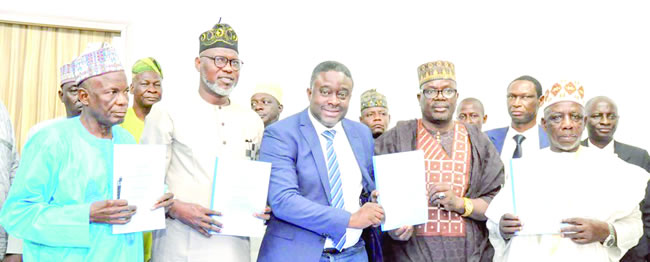The Lagos Commodities and Futures Exchange (LCFE) and the Amalgamated Traders Associations of Mile 12 International Market have signed a Memorandum of Understanding (MOU) aimed at revolutionising trade practices through the establishment of commodities auction market.
The agreement was formalised during a ceremony held at the LCFE headquarters in Lagos.
Speaking at the event, the Managing Director and Chief Executive Officer of LCFE, Mr Akin Akeredolu-Ale, described the launch of the Lagos auctions market as a significant move to align local trade with global standards.
He noted that the initiative draws inspiration from Zimbabwe’s successful auctions market which operates weekly and serves as a model for transparent price discovery, structured and regulated trading.
According to him, the primary objective of the Lagos auctions market is to create a structured and regulated environment for trading, ensuring compliance with strict standards for sanitation, packaging, and overall produce quality.
Akeredolu-Ale emphasised that this initiative was consistent with Lagos State’s vision of becoming a 21st-century city with goods and services that meet international benchmarks.
“We aim to ensure that goods reaching consumers are of the highest quality. To achieve this, we have developed guidelines for packaging and quality control, providing producers with the necessary tools to meet these standards. This effort aligns with our broader strategy to transition local markets from a domestic focus to international trade readiness,” he stressed.
In preparation for the market launch, LCFE engaged a wide range of stakeholders, including representatives from markets dealing in yams, livestock and beans.
Akeredolu-Ale noted that the participation from market leaders and associations highlighted the readiness of traders to embrace structured trading practices.
“Key benefits of the initiative include reducing post-harvest losses, introducing cold storage solutions, and establishing efficient buyer-seller connections. These measures aim to foster financial inclusion, promote sustainability, and enhance market efficiency and transparency,” Akeredolu-Ale explained.
Responding to concerns about the low literacy levels among some market participants, he noted that the initiative was designed to enhance existing market operations rather than disrupt them.
“These markets have functioned effectively for decades. Our role is to modernise and scale their operations by introducing templates for quality control, packaging and access to broader markets. The auctions market will provide a dedicated trading day, every Wednesday, for structured transactions, ensuring high-quality products are available at competitive prices. The initiative will also preserve traditional market days while introducing a specialised platform for regulated trading, enabling participants to expand their reach to international markets,” he said.
Chairman of Mile 12 International Market, Lagos, Alhaji Shehu Usman, described the MOU as a mutually beneficial partnership poised to revolutionise trade practices.
Usman expressed confidence in the collaboration of the Traders’ Association with LCFE and its potential to bring significant benefits to market members and the broader Lagos community.
“This partnership is a win-win situation. The Lagos Commodities and Futures Exchange (LCFE) has a proven track record of excellence. The Exchange is tested and trusted, so we have every reason to believe in the success of this initiative,” he stated.
Usman highlighted the extensive efforts undertaken to educate market members about the advantages of the agreement, saying: “We have explained the benefits of this partnership in multiple languages—English, Yoruba, Igbo, and Hausa—to ensure that everyone understands its value. With the collaboration of the LCFE and the Lagos State Government, we are optimistic that this initiative will run smoothly and benefit everyone involved.”
The chairman emphasized the importance of the initiative in addressing critical challenges such as food accessibility and post-harvest losses.
“Our primary goal is to ensure food is readily available to everyone. With Lagos’ population projected to grow from the current 22 to 25 million and increase from 30 to 35 million in a few years, this partnership will play a vital role in meeting demand and reducing food shortages,” he added.
Usman highlighted the necessity of continuous education to foster understanding and acceptance among stakeholders. He compared the process to the initial skepticism surrounding point-of-sale (POS) systems and the introduction of raffia baskets to reduce waste, both of which eventually gained widespread acceptance.
“Not everyone will grasp the full scope of this initiative immediately, but with ongoing education and clear examples of its benefits, we’re confident it will be embraced. This partnership is not just about improving market practices but also about creating a sustainable framework for food distribution and trade efficiency. This understanding will lead to significant progress for our market and the entire Lagos State. With the right input and cooperation, the sky is the limit,” he explained.








